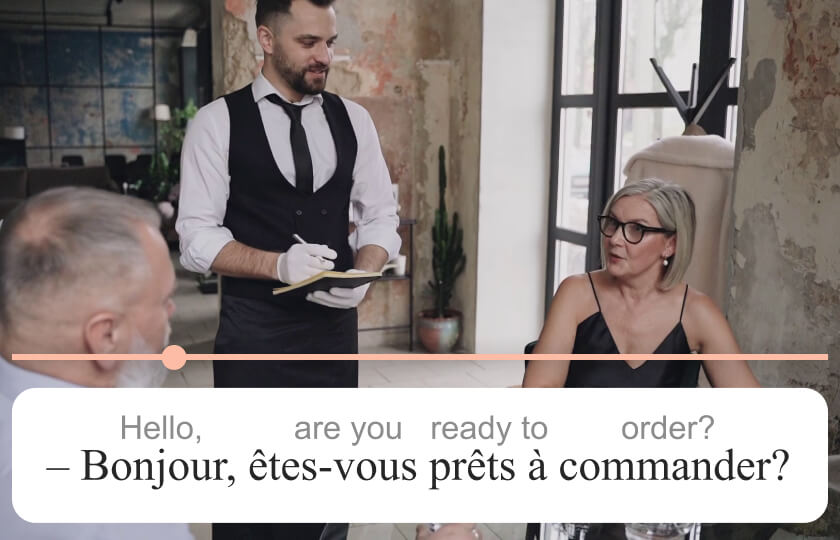So, you’re planning a trip to France or another French-speaking country? How exciting! Whether you’re heading to the romantic streets of Paris, the vibrant city of Montreal, you’re in for a treat. While you may already have your itinerary filled with activities, there’s one thing you shouldn’t overlook: learning a bit of the local language.
Knowing a few basic French phrases can make a huge difference in your travel experience, and language learning apps are a convenient and effective way to learn and practice them. We’ve tested a number of options to find out which ones are the best for helping you get around, meet locals, and enjoy your trip to the fullest.
Sidenote: If you’re interested in learning the language beyond the travel essentials, here is a comprehensive review of the best apps to learn French.
Focusing on important things
You probably don’t have much time until the trip, so it’s crucial to focus on learning the words and phrases you’ll actually use in real situations, like ordering food, finding a bathroom, or buying a ticket. It’s also important to prioritize listening and speaking practice, as those are the skills you’ll need when communicating with locals. We’ve selected the apps that do both and will give you the best chances of showing the French your verbal prowess.
Now, let’s dive into the top picks and see which one might be the best app to learn French for travel.
Lilata
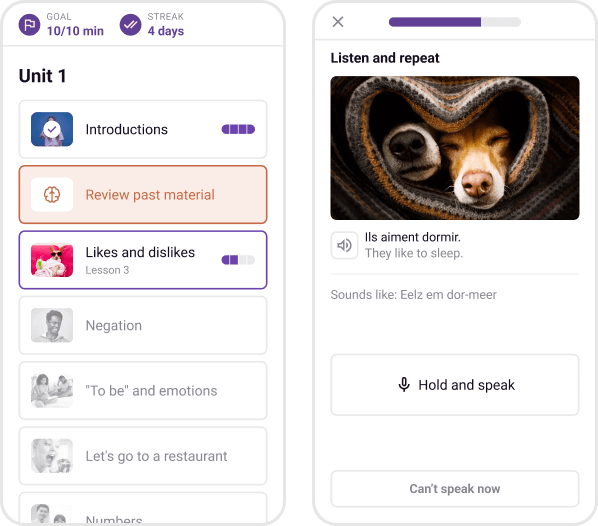
Lilata is a great app for beginners looking to learn practical, conversational French. Designed with real-life scenarios in mind, it helps you master the basics you’ll actually use, whether you’re ordering a croissant or asking for directions. The app focuses on essential skills like listening, speaking, and reading through short, fun visual lessons. As a bonus, you’ll learn some grammar basics and can leverage a spaced repetition system to aid in long-term memorization. Be aware, though, that the app requires a good internet connection.
Pros:
- Practical language: Emphasizes words and phrases that are useful in everyday situations, making it perfect for travelers.
- Short visual lessons: Each lesson is around 5 minutes long and filled with images to help you remember new vocabulary through visual associations.
- Simple grammar tips: Provides just enough grammar to help you understand and use French, without overwhelming you with complexity.
- Humorous content: Images and sentences used in lessons are quite funny, which makes learning more enjoyable and less monotonous.
- Spaced repetition: Ensures you review lessons at optimal times, helping you retain new words in your long-term memory.
Cons:
- Limited advanced content: The app is best suited for beginners and may not provide enough challenge for advanced learners.
- No offline mode: You’ll need an internet connection to access lessons, which might not be ideal if you’re traveling and don’t always have Wi-Fi.
- Technical issues: Some users have reported occasional bugs and glitches.
Pricing:
- $70/year in the US. Prices may vary in other countries.
- 7-day free trial.
- Shorter-term plans are also available.
Busuu
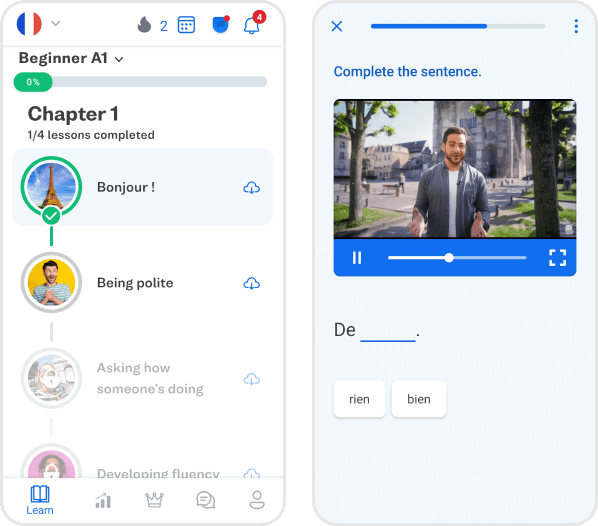
Busuu is an excellent app for people who want to learn French with the help of a community. It’s designed to offer a comprehensive learning experience that covers reading, writing, listening, and speaking skills. In addition to the main course, which includes a bit of everything, the app also offers a short secondary course specifically for travelers, available only with a subscription. Another standout feature of Busuu is its community support, where you can receive feedback on your pronunciation and writing from native speakers. However, some people find the lessons a bit too short and simplified.
Pros:
- Traveler course: Offers a short secondary course designed for travelers, which covers essential phrases and scenarios useful during travel. This course is available as part of the paid subscription.
- Community support: Allows you to submit your exercises and get feedback from native speakers, helping you refine your pronunciation and adding a human touch.
- Comprehensive skills coverage: Offers exercises that cover all the essential language skills, including reading, writing, speaking, and listening.
- Good grammar focus: Includes fairly detailed explanations of grammar rules, helping you understand the structure of the French language.
- Free version: Allows you to learn in exchange for viewing ads, but the learning experience is quite limited.
Cons:
- Short lessons: Some users may find the lessons a bit brief, which can leave you wanting more detailed explanations or practice.
- Variable feedback quality: While the community feature is valuable, the quality and usefulness of feedback can vary depending on the native speakers who provide it.
- Speaking exercises issues: There are occasional reports of the app not accurately picking up users’ voices or having technical issues with the microphone.
Pricing:
- Free version: Limited access to lessons and features, ads.
- Paid version: $83/year in the US. Prices may vary in other countries.
- Shorter-term plans are also available.
Pimsleur
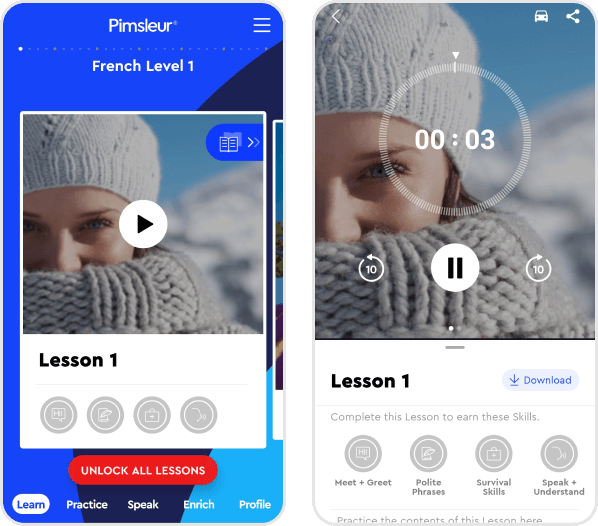
Pimsleur is renowned for its audio-based approach, focusing on teaching you to speak and understand French through conversation practice. This makes it a great choice for learners who want to build their confidence in speaking the language in real-life situations. Each lesson is around 30 minutes long, easily fitting into your daily routine, whether you’re commuting, exercising, or doing chores. The downsides of this app are that you won’t acquire much in the way of reading and writing skills, and some learners find the learning pace too slow.
Pros:
- Emphasis on speaking: Helps you practice pronunciation and conversational skills from the start. This is particularly beneficial for developing confidence in speaking with locals.
- Great for multitasking: The audio-based format allows you to learn French hands-free, making it easy to incorporate into a busy schedule.
Cons:
- Little reading and writing: The course primarily focuses on listening and speaking, so there’s less emphasis on reading, writing, and grammar. You may need to supplement your learning with other resources.
- Can be repetitive: Some learners may find the learning experience a bit monotonous, though it is designed to reinforce memory and pronunciation.
- Long lessons: Each lesson is about 30 minutes long, which might be too lengthy for some learners to complete in one sitting.
- Higher cost: Much more expensive compared to other language learning apps.
Pricing:
- $21/month in the US ($252/year). Prices may vary in other countries.
- 7-day free trial. Might not be available for some plans.
Babbel
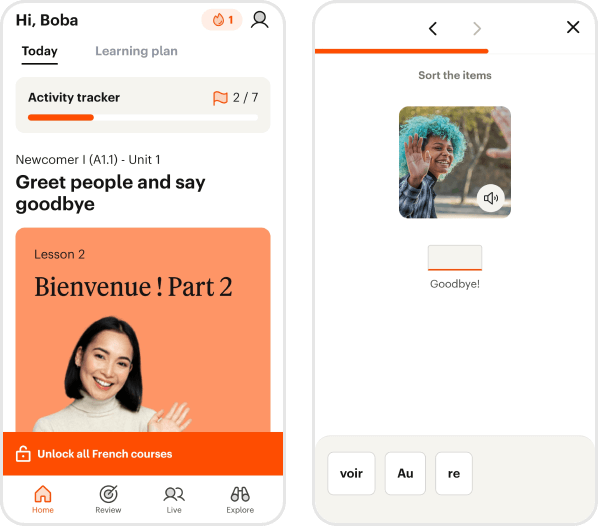
Babbel is a popular app for learners who appreciate a clear, methodical approach to building language skills. It covers a wide range of topics, including grammar, vocabulary, and practical conversation scenarios. While it doesn’t offer a dedicated course specifically for travelers, it includes many relevant lessons scattered throughout its curriculum that focus on travel-related vocabulary and situations. The main shortcomings of Babbel are that it focuses more on reading and writing, so you might not get much speaking practice, and the lessons can sometimes feel too academic and boring.
Pros:
- Well-rounded lessons: Offers a variety of comprehensive lessons covering all four key language skills. Each lesson is designed to progressively build your language abilities.
- Practical scenarios: Includes lessons that simulate real-life situations, such as introducing yourself, ordering at a restaurant, or shopping.
- Review sessions: Integrates regular review sessions to help reinforce what you’ve learned, which is crucial for long-term retention.
- Grammar tips: Provides detailed grammar explanations within lessons, helping you understand the underlying rules of the language and making it easier to form correct sentences.
- Cultural insights: Includes cultural notes and fun facts about French-speaking countries.
Cons:
- Scattered travel content: While Babbel does cover travel-related topics, you may need to skip through some other lessons to find the relevant ones.
- Limited speaking practice: Although Babbel includes speaking exercises, the focus is more on reading and writing. You may find you need additional resources to practice speaking more extensively.
- Dry lesson style: The structured, textbook-like approach may not appeal to everyone.
- Technical issues: Some users have reported occasional bugs and glitches, particularly following app updates.
Pricing:
- $84/year in the US. Prices may vary in other countries.
- 7-day free trial.
- Shorter-term plans are also available.
Memrise
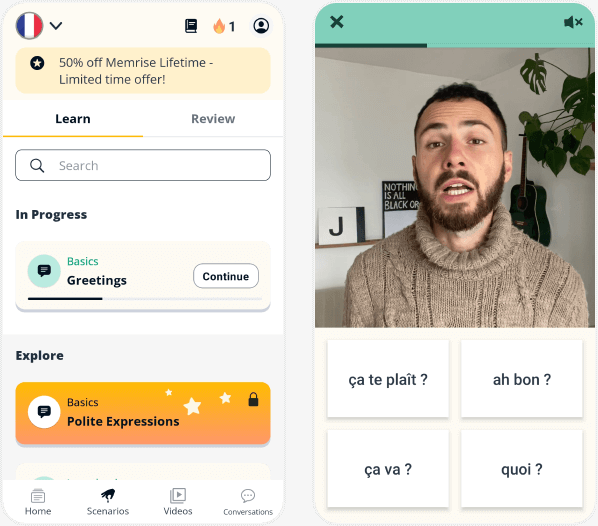
Memrise is an app focused on helping learners build their French vocabulary through gamified lessons. It stands out with its use of real-life videos featuring native speakers, which helps improve pronunciation and listening skills. It has many travel-focused lessons, although they are somewhat scattered throughout the broader curriculum. While Memrise is strong in vocabulary building, it’s not as good at explaining grammar or building in-depth language skills.
Pros:
- Focus on long-term memory: Uses spaced repetition to ensure that you review words and phrases at optimal intervals, helping to reinforce your memory.
- Videos: Includes videos of native speakers, providing authentic examples of pronunciation and usage. This is particularly helpful for improving listening skills and getting used to different accents.
- Mnemonic techniques: Employs creative memory aids to help you remember new vocabulary faster.
- Gamified: Points, levels, and challenges make learning feel like a game, which helps keep you motivated and consistent in your practice.
- Free version: You can use the app for free, but the amount of learning you can do per day is limited, as well as access to some lessons and features.
Cons:
- Scattered travel content: The travel-related lessons are not grouped together, making it necessary to search through the app to find relevant topics.
- Not comprehensive: Doesn’t provide in-depth coverage of grammar or comprehensive language skills. You need to supplement it with other resources for a well-rounded learning experience.
- Requires internet: Most features require an internet connection, which could be a drawback if you want to study offline, especially while traveling.
Pricing:
- Free version: Limited access to lessons and features.
- Paid version: $72/year in the US. Prices may vary in other countries.
- Several shorter- and longer-term plans are also available.
Frequently asked questions
Is it hard to travel in France without speaking French?
There’s a stereotype that the French don’t speak English, but this is an oversimplification. In reality, many French people do speak English, especially in larger cities and tourist areas. However, in smaller towns and rural areas, English speakers can be less common. Knowing a few basic French phrases can make a big difference when traveling, helping you order food, ask for directions, and interact with locals more smoothly. Even if your French is limited, making an effort to use the language is often appreciated by locals and can enhance your overall experience.
How to learn French before traveling?
You can start with language apps like Lilata, Busuu, or Pimsleur, which offer structured lessons and practical phrases for travel scenarios. Focus on key topics such as ordering food, asking for directions, and booking accommodations. Emphasize listening and speaking practice. Supplement your learning with French YouTube channels like French Comprehensible Input and podcasts like Coffee Break French. Lastly, use flashcard apps like Memrise and Anki to reinforce vocabulary and phrases, ensuring you’re well-prepared for your trip. Lastly, be aware that for every question you’re able to ask in French, you’ll need to understand the potential responses.
How long does it take to learn French for travel?
The time it takes to learn French for travel depends on several factors, including your prior language experience, the amount of time you can dedicate to learning, and your specific goals. Generally, if you aim to acquire basic conversational skills and essential travel phrases, you can make significant progress in a few months with consistent study. Spending around 15-30 minutes per day using language learning apps, practicing speaking and listening, and immersing yourself in French media can help you reach a practical level for travel. However, the more time and effort you invest, the more proficient you’ll become.
How long does it take a beginner to learn French fluently?
On average, achieving fluency in French can take anywhere from a few years of consistent study to longer, depending on how intensively you practice and use the language. The Foreign Service Institute estimates that it takes approximately 600-750 hours of study for an English speaker to reach a proficient level in French. However, fluency is not just about studying but also about practicing speaking, listening, reading, and writing in real-life contexts. Engaging in conversations with native speakers, immersing yourself in French media, and even spending time in a French-speaking country can significantly accelerate your learning. It’s important to set realistic goals, be patient with your progress, and enjoy the learning process.
Also, check our article on the best ways to learn French.
Final thoughts
Learning French can be a rewarding yet challenging journey. The language has its complexities, from tricky pronunciation to intricate grammar rules, which can make it seem daunting for beginners. However, the hardest part is getting started.
While there is some truth to the stereotype that the French aren’t always welcoming, many appreciate it when visitors try to speak their language, even if it’s just a few phrases. This effort not only helps in navigating daily interactions but also enriches your travel experience by allowing you to connect more deeply with the culture and people.
Language learning is a gradual process, and every step you take brings you closer to fluency. So, keep practicing, stay patient, and enjoy the journey of learning this beautiful language. Bon voyage and happy learning!
